Elvis Presley’s ’68 Comeback: Burbank to Graceland
by Neal Umphred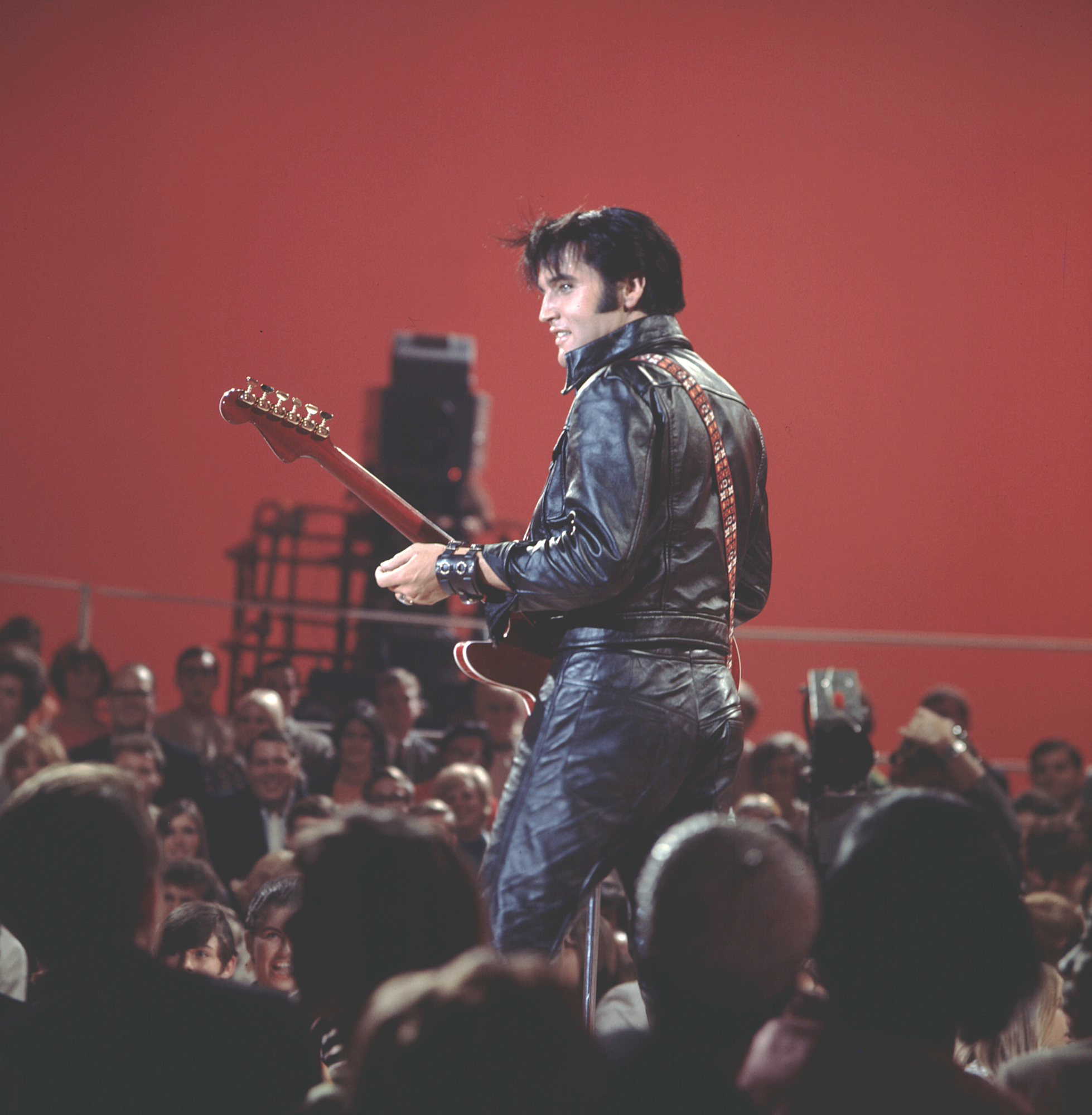
Elvis during the ’68 special. (Photo: Courtesy of Graceland)
At 9:00 p.m. on December 3, 1968, the televisions of millions of American homes were tuned to NBC, where they were greeted with this welcoming line: “If you’re looking for trouble, you’ve come to the right place.” After an eight-year hiatus, Elvis Presley was back on TV. He was joined by guitarist Scotty Moore and drummer D.J. Fontana, both of whom had been with Elvis on his historic TV appearances in 1956 and ’57.
Television had changed a lot in those years: Presley was in glorious color for the first time! And he filled much larger screens than the tiny black-and-white sets that had showed a grainy version of him with Frank Sinatra in 1960, the last time he’d sung to a national audience.
And it was only the beginning: For the next 60 minutes, viewers saw and heard some of the rawest, hardest rock and roll music of their lives. And it worked: Elvis was the top-ranked show of the week, beating out the hugely popular Rowan & Martin’s Laugh-In. The reviews that followed were generous, and the show’s producer, Bob Finkel, would later be given a Peabody Award for this special.
Tell me why can’t my dreams come true
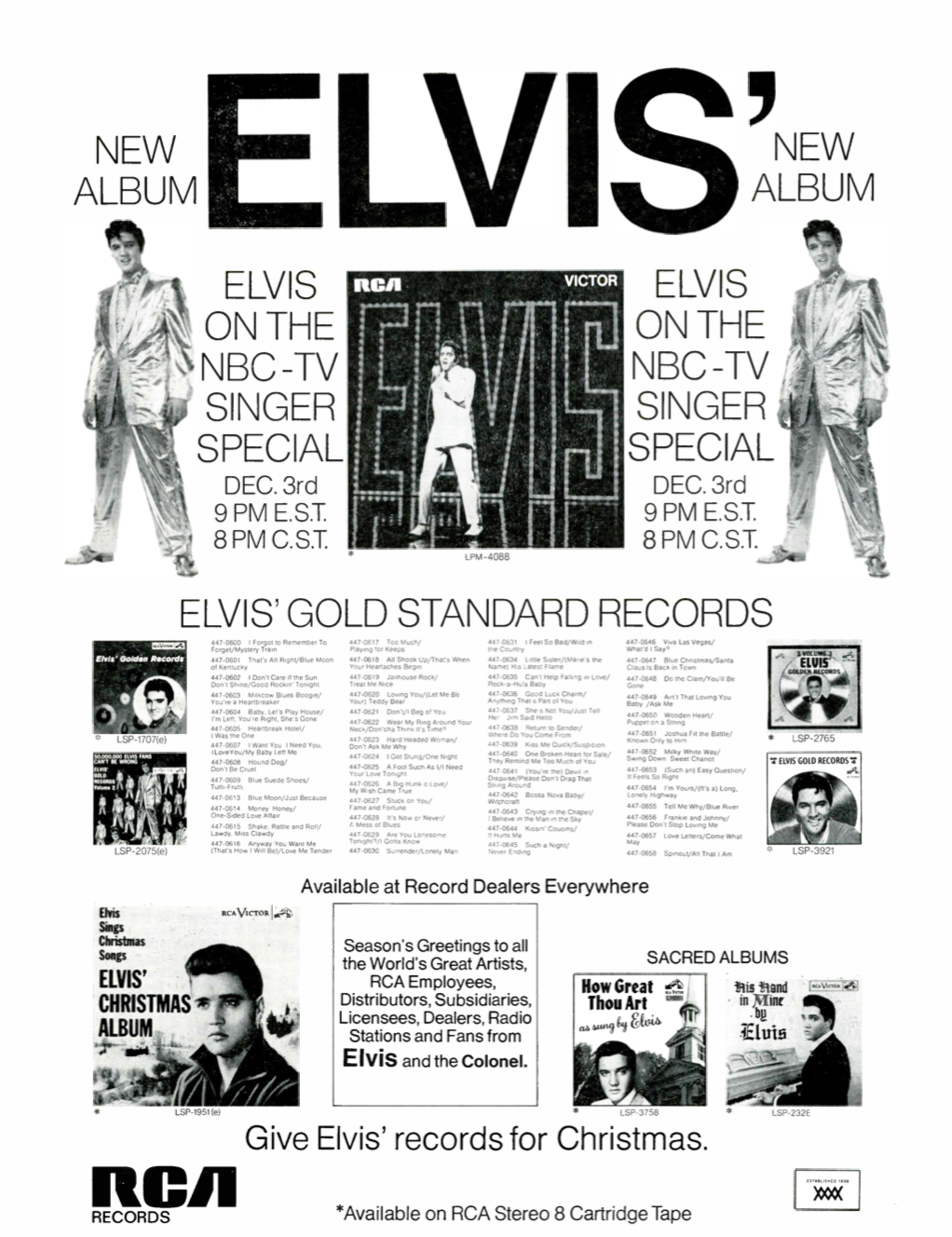
This ad for the special and Elvis’ RCA catalog appeared in the Nov 30, 1968 issue of Record World
But it was the response of the people that mattered: In the wake of the television broadcast, the single from the show, “If I Can Dream”—a heartfelt appeal for universal brotherhood and acceptance—peaked at #9 on the Cash Box Top 100 survey. It was Presley’s first Top 10 single in three years, selling close to a million copies in the U.S. (It reached #12 in Billboard.)
The soundtrack album, Elvis, reached the Top 10 on Billboard’s LP chart, also the first time that had happened in three years. These two records were hits around the world, the first time that Presley had enjoyed such global success since “Crying in the Chapel” in 1965.
In hindsight, all of this looks almost inevitable: How could such determination, such ambition, such genius not be appreciated on a massive scale? But that was anything but predictable when the show aired that December, for on that late 1968 day, Elvis had fallen from the pinnacle of success. He had made too many movies and the numbers at the box office and for their soundtracks had taken a noticeable hit. Whereas the soundtracks from his seven films from 1957’s Loving You through 1963’s Fun in Acapulco never failed to reach the top 5 in sales, none of the six titles from 1966 through spring 1968 even reached the top 10.
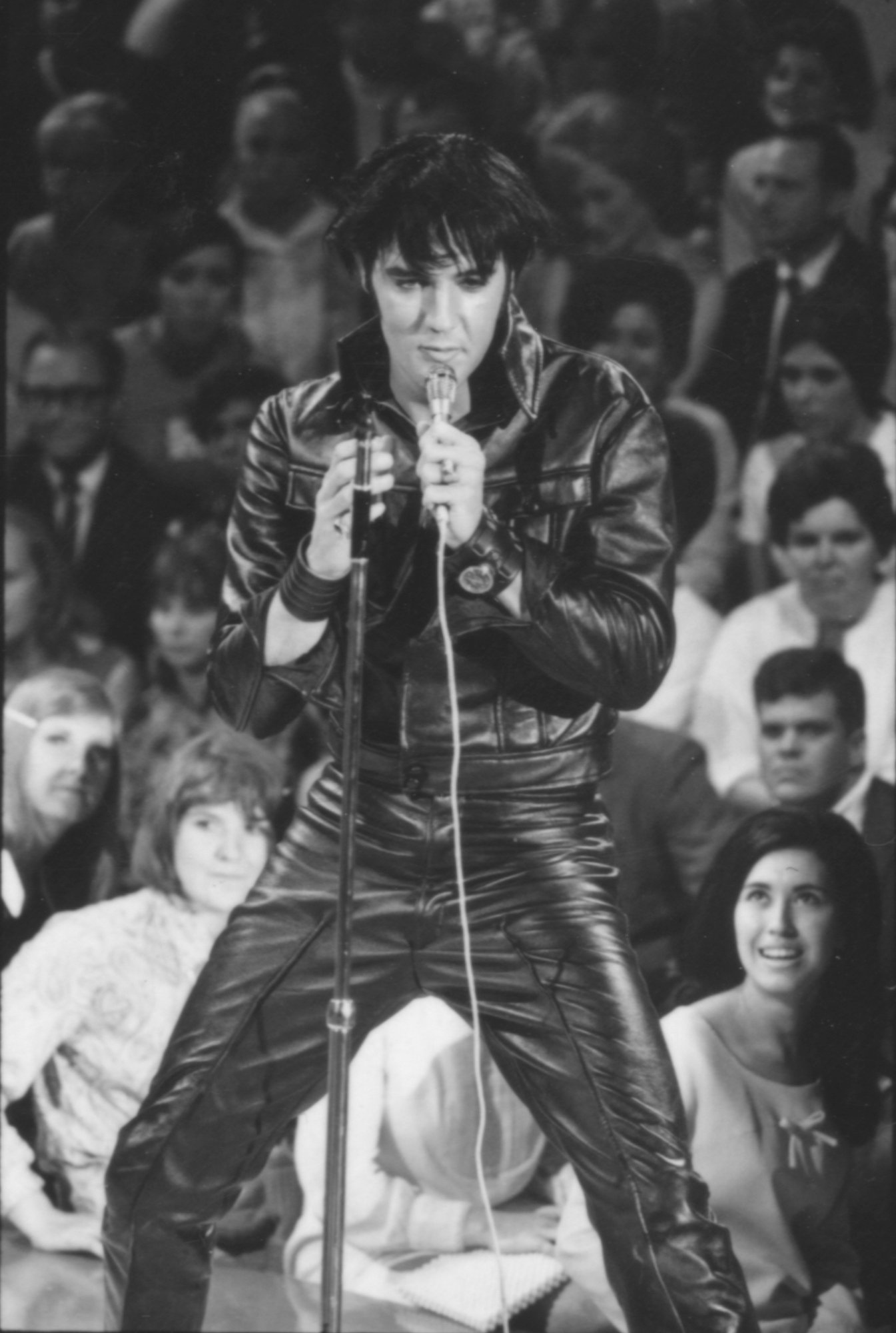
Elvis during the ’68 special. (Photo: Courtesy of Graceland)
In the 1950s, Elvis had been the personification of rock and roll; it often seemed that he had singlehandedly established the genre as the most popular music in the world. By 1968, though, rock and roll had moved from the British Invasion through folk-rock into psychedelia and progressive rock—and all of that in just the past four years! By 1968, Elvis Presley recognized that he needed a return to relevance.
Singer Presents Elvis
With the special in essentially uncharted territory, Presley’s manager Colonel Tom Parker found a “safe” sponsor: the Singer Sewing Machine Company. While the correct title of the show broadcast on NBC-TV was simply Elvis, because of their backing and their promotion, the show is often referred to as “Singer Presents Elvis.” It is also known as the “NBC-TV Special” and “the ’68 Comeback.”
Watch how it began
And it was a comeback: On December 4, 1968, the day after the special, it was suddenly OK, almost cool, to like all things Elvis again.
Watch Elvis Presley sing his Sun Records classic “That’s All Right” on the ’68 special
We’re caught in a trap
This cool period was carried forward by the records Elvis made with producer Chips Moman at American Sound Studio in Memphis in early 1969. “In the Ghetto,” written by Mac Davis, found a white Southern man addressing the problems of black northern inner cities. In the hands of most singers, this song would have sounded contrived, forced, perhaps even pandering. Elvis made it sound like a gentle call-to-arms to the very brothers he had reached out to with his previous single, “If I Can Dream.”
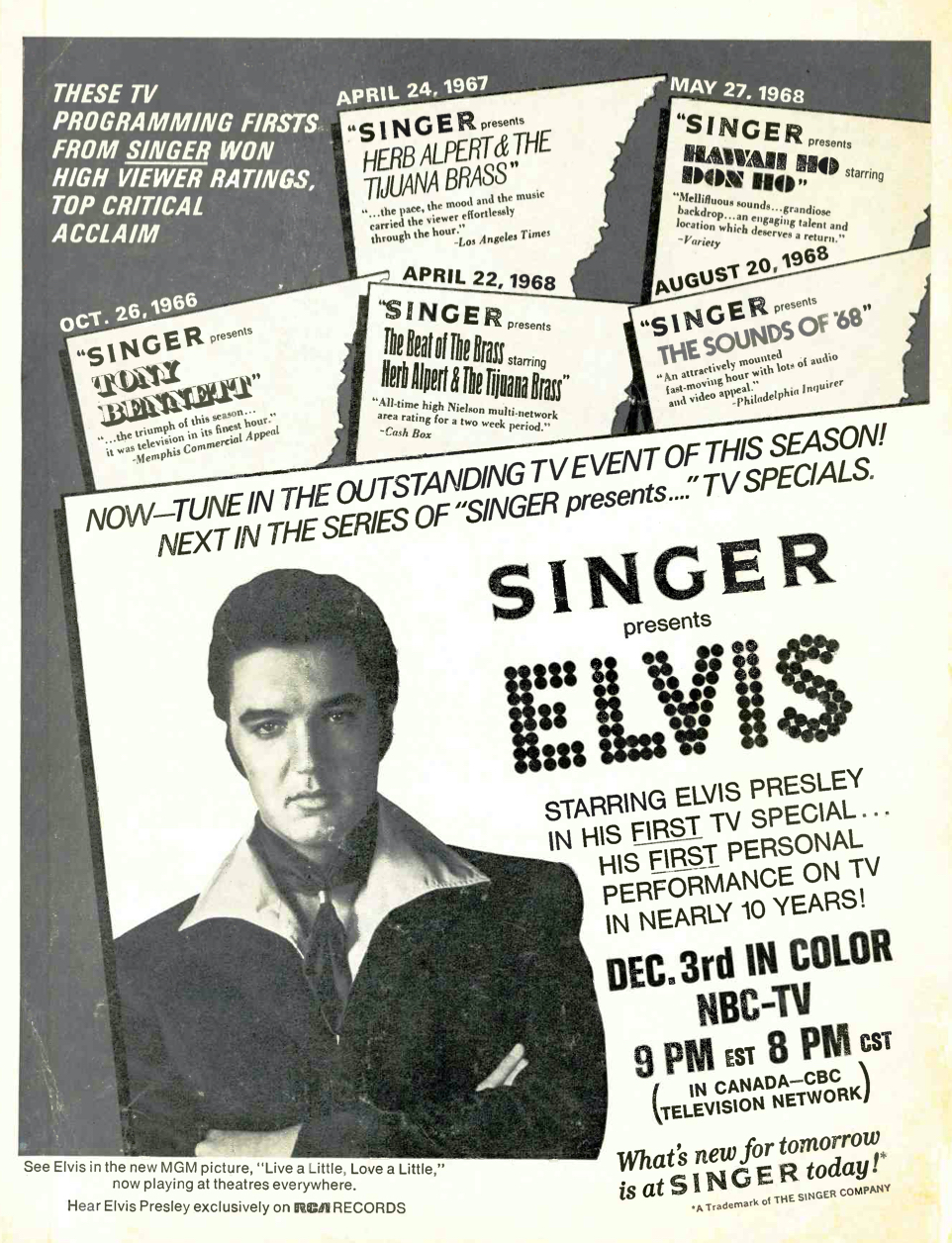
Another ad for the special, from the Dec. 7, 1968 issue of Record World
The album was titled From Elvis in Memphis and was a heady mixture of rock, country and something new for Elvis, Southern soul music. This album showed the world that he could make a solid album from first track to last. It cemented his new stature as a potent force in the rock market.
Then came the next single, “Suspicious Minds,” written by Mark James. This was so masterful a record that a single hearing could leave a listener thinking he had just heard the greatest moment in Presley’s career.
And just as important as the music was the response: The records sold millions of copies all over the world. In 1969 and ’70, Presley received more RIAA Gold Record Awards that he had received at any time in his career.
In July of ’69, Elvis returned to live performing on the stage of the International Hotel in Las Vegas, boosting his visibility and name recognition.
Watch the King perform a medley of some of his early hits during the special
Pilgrims with families are going to Graceland
By the final days of the decade, Elvis was arguably as famous as he had been in the ’50s. Due to the staggering growth in communication media—especially globally—and the growing interest in celebrities’ private lives, many aspects of Presley’s life became household words.
Among those aspects of Presley’s life attaining their own international celebrity were his wife Priscilla Presley and Elvis’ Memphis home, Graceland. In fact, the two are conjoined: after establishing herself as a successful actress, Priscilla became the guiding force in establishing Graceland as one of this country’s most visited places. Under her eye and hand, the name “Graceland” began to take on cultural meaning—metaphorical if not almost spiritual meaning—beyond merely being the home of a star. The most famous use of Graceland as metaphor is Paul Simon’s brilliant album of the same name, Graceland (1986). According to Simon, the song “Graceland” is partly about a trip to Elvis’ home by a man with his 9-year-old son “trying to find some kind of solace from a loss of love” there.
This theme was carried on more directly and more poignantly in David Winkler’s 1999 film Finding Graceland. Harvey Keitel, one of the least likely actors on the planet to “play” Elvis, is a lost soul who believes that he is, in fact, Elvis Presley, that he took a leave of absence from being “the king” to get away from the craziness and find some comfort with the people. His people. The movie deals with his need to return home, to Graceland, to find solace and closure to his life and to his journey. It is a lovely movie that does not require even liking Presley, but it does require the viewer know something about Graceland—which everyone does.
Those 60 minutes of music and passion and playfulness changed so many things on December 3, 1968. And Graceland has, over the ensuing years, become a metaphor with a life of its own. As Paul Simon sang, “I’m going to Graceland for reasons I cannot explain. Maybe I’ve a reason to believe we all will be received in Graceland.”
Watch Elvis sing “Trying to Get to You” from the 1968 special
Set list from the 1968 special, taped June 27, 1968, NBC Studios, Burbank, Calif.
“Trouble”/”Guitar Man”
“Lawdy Miss Clawdy”
“Baby What You Want Me to Do”
“Heartbreak Hotel”/”Hound Dog”/”All Shook Up”
“Can’t Help Falling in Love”
“Jailhouse Rock”
“Love Me Tender”
“Are You Lonesome Tonight?”
Gospel Production Number:
“Sometimes I Feel Like a Motherless Child”/”Where Could I Go But To The Lord”/”Up Above My Head”/Saved
“Baby, What You Want Me To Do”
“Blue Christmas”
“One Night”
“Memories”
Guitar Man Production Number:
“Nothingville”/”Guitar Man”/”Let Yourself Go”/”Guitar Man”/”Big Boss Man”/”It Hurts Me”/”Guitar Man”/”Little Egypt”/”Trouble”/”Guitar Man”
“If I Can Dream”
Related: The story behind the inspiring “If I Can Dream”
Related: The top radio hits of 1968
- Elvis Presley’s ’68 Comeback: Burbank to Graceland - 12/03/2023

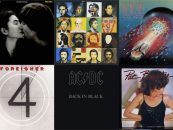
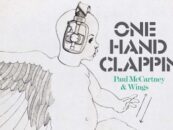
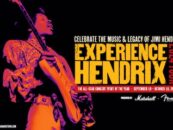
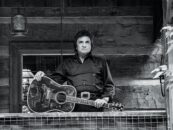

14 Comments so far
Jump into a conversationBones Howe produced the music for the 1968 Special.
Author Neal Umphred replies: Thank you for pointing that out: you are correct and I should have mentioned Mr. Howe. For the NBC Special, Bob Finkel was listed as the Executive Producer, while Steve Binder was the hands-on Producer/Director in charge of the television show. His previous work included directing the legendary “T.A.M.I. Show” in 1964, and the television musical series “Hullabaloo” in 1965-1966.
Howe was credited as the Musical Supervisor for the special, meaning he was the Producer and the Director of the musical segments of the show. Howe was an established engineer, having worked the board at Radio Recorders in Los Angeles from 1956 to 1962. He does not get the credit he deserves for capturing the vitality of Elvis in the raw in June ’68.
At Radio Recorders he engineered Purple People Eater. Bones was the first independent recording engineer. He engineered all the Mamas and Pappas records and then produced the Association’s Windy and the when working with the Fifth Dimension won Grammy for Record of the Year his production of Aquarius. He also produced Tom Waits
Enjoyed the article! Elvis will live forever in all our hearts!
+Very good article. Quite informative.
knowledge is power, & Umphred delivers!
On behalf of Neal, thanks!
“Baby, What Do You Want Me To Do” is one of my all time favorite Elvis songs and performances. The 68′ Comeback Special kicks ass for so many reasons! Great Article!
As I read the piece above, I kept thinking things like, “Wow—this is really well written” and “Bravo—this guy knows what he’s talking about.”
Then the writer mentioned my favorite Elvis movie, Finding Graceland, and I thought, “I gotta write this guy a comment,”
It was when I scrolled down to the bottom that I discovered I had written this piece six years ago!
I don’t know what to blame my flagging memory on: old age (“My boy, my boy”) or sobriety (ten years without drugs or alcohol and still counting).
Ohl, well—as someone once famous once said, “Rockahula, baby!”
yep Neal, as Sinatra once sang… “That’s Life”. If you’re lucky, ya grow old (& usually forgetful) then ya die. ’65 Mr. Tambourine Man… guess ya didn’t go to the theater & see Thunderball. Cuz if ya had, you woulda heard the supersonic, spine tingling voice of TOM JONES booming out of the theater speakers & you would have left the theater with goosebumps, asking yourself, who the hell was THAT!! It’s Not Unusual thru Say You’ll Stay Until Tomorrow would have opened up a whole new world to a rock-pop vocally musical genius, as it did for The King & The Chairman Of The Board!
Tom Jones sounds as good today as he did back then.
ERR
If I remember correctly (hah!), I disliked Goldfinger and Thunderball so much that I haven’t paid for a ticket to a Bond movie since!
In fact, the only Bond movies I have enjoyed since From Russia With Love have been the Daniel Craig movies—and I say that as a BIG fan of Pierce Brosnan.
NU
PS: I agree that Tom Jones has the perfect voice for booming out of movie theater sound systems.
Goldfinger was the best Bond movie! And that Shirley Bassey theme song was perfect for it!
Hi Jeff,
Much obliged on the TJ support! He can still out sing any fucka around, But as good today as in his heyday… if wishes were fishes. And yes, the F Welshie was = to her M com padre’s.Best 2 Bond themes & movies hands down.
As for you, MR. Umphred… D. Craig.. yuk! Sean & Pierce!! & TJ has the Perfect Voice… Period! Greatest Rock-Pop-Blue eyed Soul Voice ever recorded!! Regardless, of course, Elvis still rules 🙂 As for your forgetfulness, its ok to forget what you wrote, just don’t forget how to write! Keep up the great work!!